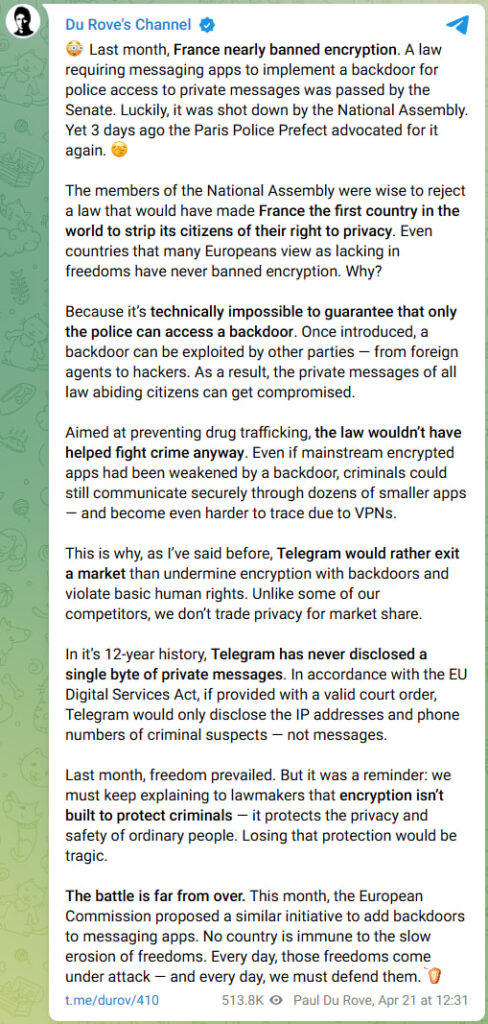
Telegram founder Pavel Durov has reiterated his company's refusal to compromise user privacy, warning that the messaging platform will leave the French market if compelled to implement encryption backdoors.
The statement follows renewed pressure from French authorities to mandate surveillance access to private messages.
The controversy centers on a French Senate-backed bill from March 2025 that would have required messaging services to provide police with backdoor access to encrypted communications. While the National Assembly ultimately rejected the legislation, Paris Police Prefect Laurent Nuñez reignited the debate three days ago by publicly supporting its reintroduction. In response, Durov issued a public statement on his Telegram channel on April 21, condemning the proposal and defending Telegram's longstanding policy of refusing to weaken encryption.
Telegram, founded in 2013 by Russian-born entrepreneur Pavel Durov, is a cloud-based messaging platform known for its speed, broad feature set, and emphasis on privacy. With over 900 million active users worldwide, it has become a popular communication tool — especially among users seeking alternatives to mainstream messaging platforms. However, its refusal to support legally-substantiated wiretapping requests or to respond to cybercrime abuse on its platform has drawn sharp criticism from Western governments and law enforcement agencies.
Durov argues that introducing a backdoor to end-to-end encryption is not only a violation of basic rights but also a technical impossibility if security is to be maintained. “Once introduced, a backdoor can be exploited by other parties — from foreign agents to hackers,” he stated, warning that such a move would endanger the privacy of all users, not just criminals.

The original bill claimed to target drug trafficking, but Durov dismissed its utility, pointing out that criminals could easily shift to using lesser-known encrypted apps and cover their tracks with VPNs. “Even countries that Europeans perceive as repressive have never banned encryption,” he said, emphasizing the global recognition of encryption as a pillar of digital security.
Telegram's stance is particularly notable given its strained relationship with French authorities. In August 2024, Durov was charged by France's Public Prosecutor with 12 offenses, including complicity in cybercrime, refusal to cooperate with interception requests, and facilitating the dissemination of illicit materials. He was arrested at Le Bourget Airport and detained for several days while under investigation. The charges were widely viewed as an escalation of France's frustration over Telegram's resistance to law enforcement cooperation.
France's efforts also form part of a broader EU-wide push to regulate encrypted services. This month, the European Commission proposed similar legislation that would require messaging apps to implement backdoors for authorized government access — reviving fears of continent-wide erosion of digital privacy.
Despite Telegram's controversial privacy practices — such as logging IP addresses and lacking full end-to-end encryption by default — Durov insists the platform will not betray user trust. He stated that Telegram has never disclosed private messages in its 12-year history, and when required to comply with EU Digital Services Act provisions, it only provides phone numbers and IP addresses of suspects upon valid court orders.
Given all the government push for implementing backdoors on messaging apps, users are recommended to use platforms with verifiable end-to-end encryption, enable disappearing messages, and consider using VPNs to reduce traceability, especially in regions with heightened surveillance.







Leave a Reply